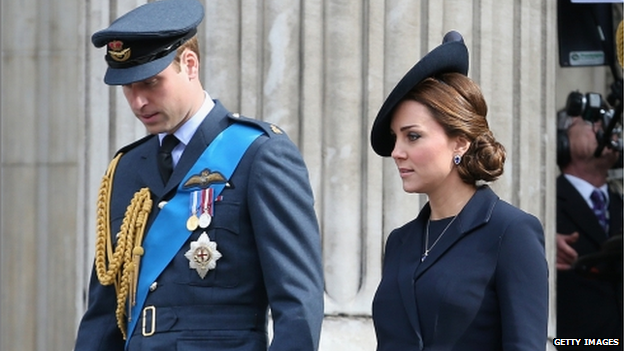New rules on royal succession come into force
- Published

Under the new rules of royal succession the Duke and Duchess of Cambridge's second child will be fourth in line to the throne
New rules on royal succession have come into force, removing male bias and discrimination against Roman Catholics.
If the Duke and Duchess of Cambridge's new baby is a girl, she will follow Prince George and become fourth in line to the throne and will not be overtaken by any future younger brothers.
The new rules also allow members of the Royal Family to marry a Roman Catholic and become king or queen.
However, a Roman Catholic royal still cannot become the monarch.
Deputy Prime Minister Nick Clegg confirmed the Succession to the Crown Act had come into force in a written ministerial statement.
, but all the countries in which the Queen is head of state had to pass any necessary legislation before it took effect.
New rules
The changes to the rules of succession were rushed through Parliament ahead of the birth of Prince George in 2013.
But the arrival of a son for William and Kate meant George became third in line to the throne even without the new legislation.
Under the former rules of male primogeniture, royal sons took precedence over their female siblings, including first-born royal daughters.
The act also replaces the Royal Marriages Act 1772 and means that only the first six in line to the throne need the Queen's consent to marry.
This replaces a long-standing procedure which affected any distant royal relations who are descendants of George II.
What changes?
Princess Eugenie, who is currently seventh in line to the throne, no longer needs her grandmother's permission to marry.
Princess Beatrice still needs the Queen's consent to marry if she gets engaged before the arrival of William and Kate's second child. After the baby is born, Beatrice drops down to seventh in line to the throne.
Prince Michael of Kent, the Queen's first cousin, is now back in the line of succession at number 47. He was removed when he married his Catholic wife, Princess Michael of Kent, 37 years ago.
Lord Nicholas Windsor, son of the Duke and Duchess of Kent, and his children, who are Catholic are also affected.
Prince George's children could be affected if his wife is Roman Catholic. Their children could be brought up in that faith and could be barred from becoming monarch and supreme governor of the Church of England because they were Roman Catholic.
The Princess Royal does not jump ahead of her younger brothers, the Duke of York and the Earl of Wessex, because the act is not retrospective.
Six realms in addition to the UK legislated for the changes: Australia, Barbados, Canada, the Grenadines, New Zealand, St Kitts and Nevis and St Vincent.
Nine others concluded that the legislation was not necessary: Antigua and Barbuda, Bahamas, Belize, Grenada, Jamaica, Papua New Guinea, St Lucia, Solomon Islands and Tuvalu.
Mr Clegg wrote: "The act reflects this Government's emphasis on equality by removing centuries of discrimination on both religious and gender grounds.
"The act puts in place succession laws that are fit for the 21st century and for a modern constitutional monarchy."
- Published13 December 2012